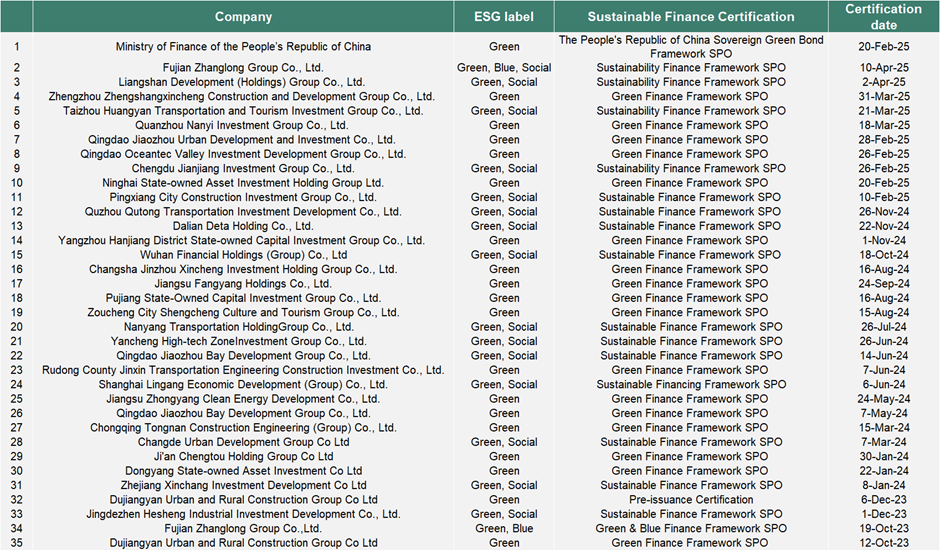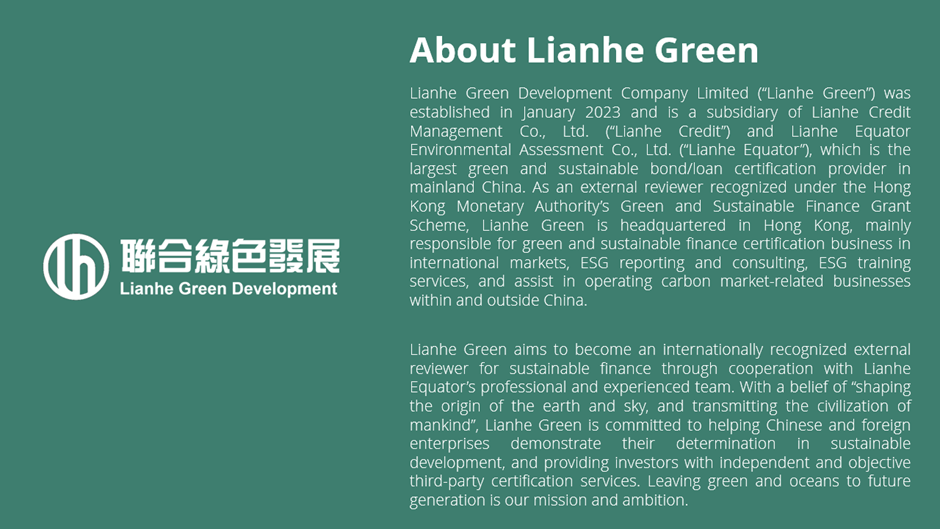 return
return
 current location:Home
current location:Home
 News and Events
News and Events
 News and Events
News and Events
 【ESG News】Global Trends Biweekly Newsletter Issue 32 (2025.4.21-2025.5.4)
【ESG News】Global Trends Biweekly Newsletter Issue 32 (2025.4.21-2025.5.4)
 return
return
 current location:Home
current location:Home
 News and Events
News and Events
 News and Events
News and Events
 【ESG News】Global Trends Biweekly Newsletter Issue 32 (2025.4.21-2025.5.4)
【ESG News】Global Trends Biweekly Newsletter Issue 32 (2025.4.21-2025.5.4)
category:News and EventsRelease time:2025-05-06

Hong Kong China ESG trends
HKMA Annual Report 2024 and Sustainability Report 2024
The Hong Kong Monetary Authority (HKMA) today (25 April) published its Annual Report 2024, including the financial statements of the Exchange Fund, and its Sustainability Report 2024. The Sustainability Report sets out the HKMA’s strategy and priorities in embedding sustainability at the core of Hong Kong’s financial system, including strengthening climate-resilience and enhancing the ecosystem, while operating as a responsible investor and sustainable organisation.
Source: https://www.hkma.gov.hk/chi/news-and-media/press-releases/2025/04/20250425-6/
Lianhe Green Insights:
As a banking regulator, HKMA focuses on enhancing the climate resilience of the banking sector and supporting banks in maintaining safety and soundness during their transition to net-zero emissions. In addition to its regulatory role, the HKMA also acts as a facilitator, committed to promoting the development of a green and sustainable finance ecosystem and supporting banks in providing financing for the transition.
International ESG trends
UN Environment Programme Finance Initiative (UNEP FI) Published Guidance on Responsible Policy Engagement
The Guidance on Responsible Policy Engagement, captures best practice and offers recommendations for developing and implementing effective policy engagement strategies, supporting banks in implementing Principles for Responsible Banking (PRB) “Principle 4: Stakeholder Engagement.”
The guidance covers practical steps including prioritizing engagement based on regional relevance and risk, participating in local, regional and global industry initiatives, building relationships with a variety of stakeholders, and managing trade association memberships to ensure alignment with sustainability values. Further, this guidance outlines potential solutions to common challenges faced by banks including establishing a clear engagement framework, ensuring oversight across key committees, and maintaining internal consistency in policy positions.
Source: https://www.unepfi.org/industries/banking/guidance-on-responsible-policy-engagement/
Lianhe Green Insights:
The Guidelines on Responsible Policy Engagement provide invaluable guidance for banks in practicing the principles of responsible banking. Emphasizing robust governance and integrated oversight helps banks integrate policy engagement into their overall strategy, bridge the gap between commitment and action, and drive the economy towards a sustainable transformation. This is of great significance to the sustainable development of the banking industry.
Carbon Border Adjustment Mechanism (CBAM): Policy Update
On 24 April 2025, the government published the draft primary legislation for the carbon border adjustment mechanism (CBAM) for technical consultation. Verification of emissions data for CBAM will be required by a body accredited by an International Accreditation Forum member.
Lianhe Green Insights:
After extensive public consultation, the UK government formally released the initial legislative draft of the CBAM. This marks a significant step in implementing its climate goals and guarding against carbon leakage, demonstrating a firm commitment to strengthening carbon responsibility and advancing the development of a carbon border mechanism.
Mainland China ESG trends
Xi Jinping Delivers Remarks at the Leaders Meeting on Climate and the Just Transition
The meeting emphasized accelerating the just transition. Countries must adopt a people-centered approach to advance the well-being of people and climate governance in tandem, and strike a balance between multiple goals including environmental protection, economic growth, job creation, and poverty alleviation. Developed countries are obliged to extend assistance and support to developing countries, help drive the global shift toward green and low-carbon development, and contribute to the common and long-term well-being of people of all countries.
Source: https://www.fmprc.gov.cn/eng/xw/zyxw/202504/t20250425_11604454.html
Lianhe Green Insights:
A just transition is the essential pathway to achieving sustainable economic development. From the national level to industries and enterprises, social equity must be integrated into the core of strategies. Financial institutions, in particular, should drive inclusive growth through capital allocation. In the future, as the global carbon neutrality process accelerates, the collaboration model among governments, businesses, and the financial sector will be the key to the success of a just transition. Only by ensuring that “no one is left behind” can the green economy truly benefit the entire society.
Notice on the Issuance of the National Plan of China for the Implementation of the Montreal Protocol on Substances that Deplete the Ozone Layer (2025-2030)
The plan proposes 11 specific tasks in four areas: source control, process management, end-of-pipe treatment, and import/export management. The substances subject to control include nine categories: chlorofluorocarbons (CFCs), halons, carbon tetrachloride, methyl chloroform, hydrobromofluorocarbons, bromochloromethane, methyl bromide, hydrochlorofluorocarbons (HCFCs), and hydrofluorocarbons (HFCs).
Additionally, in terms of strengthening the management of the use of controlled substances, it is explicitly stated that, starting from January 1, 2026, the home appliance industry will prohibit the production of refrigerators and freezers using hydrofluorocarbons as refrigerants.
Source: https://www.mee.gov.cn/xxgk2018/xxgk/xxgk03/202504/t20250423_1117396.html
Lianhe Green Insights:
China is accelerating the phase-down of high-GWP greenhouse gases such as HCFCs and HFCs. By establishing a comprehensive quota management system across the entire supply chain and strengthening the supervision of production, use, and import/export, China is promoting the green and low-carbon transformation of relevant industries. The country also encourages the substitution with natural refrigerants and the recycling and reuse of these substances. This not only fulfills international commitments but also demonstrates China's strategic determination to advance pollution reduction and carbon mitigation in tandem with the construction of ecological civilization.
Letter on Soliciting Opinions on the "First Standard for Corporate Sustainability Disclosure —— Climate (Trial) (Draft for Comments)"
In order to thoroughly implement the spirit of the 20th National Congress of the Communist Party of China and the second and third plenary sessions of the 20th Central Committee, promote the sustainable development of the economy, society, and environment, and steadily advance the construction of China's sustainability disclosure standards system to regulate corporate disclosures related to sustainability, the Ministry of Finance of the People's Republic of China has drafted the “First Standard for Corporate Sustainability Disclosure —— Climate (Trial) (Draft for Comments)” (“Standards”).
Source: https://kjs.mof.gov.cn/gongzuotongzhi/202504/P020250429630984553145.pdf
Lianhe Green Insights:
The Standard is a significant attempt by China to adopt the "IFRS S2 — Climate-related Disclosures" issued by the ISSB. The Standard is generally aligned with international standards in terms of the disclosure of climate-related risks and opportunities. However, for important but more challenging information to disclose, such as Scope 3 greenhouse gas emissions, financed emissions, and scenario analysis, companies are currently encouraged to implement these on a voluntary basis. This takes into account the actual situation of Chinese companies while also fully expressing China's determination to firmly follow a low-carbon and green development path.
The Draft Code of Ecological and Environmental Protection Submitted for First Review
On April 27, the Draft Code of Ecological and Environmental Protection was submitted for review at the 15th session of the Standing Committee of the 14th National People's Congress. This will be the second law named as a "Code" in China following the Civil Code. The draft code is divided into five parts, namely: General Provisions, Pollution Prevention and Control, Ecological Protection, Green and Low-carbon Development, and Legal Liability and Supplementary Provisions, with a total of 1,188 articles.
Source: https://www.spp.gov.cn/zdgz/202504/t20250428_694434.shtml
Lianhe Green Insights:
The Code of Ecological and Environmental Protection is the second law named as a "Code" in China following the Civil Code. The compilation of this Code is a significant deployment in the rule of law construction made by the Party Central Committee. It aims to systematically integrate the existing ecological and environmental legal systems and build a Code of Ecological and Environmental Protection that is characterized by Chinese features, reflects the characteristics of the times, and represents the will of the people. The compilation and implementation of this Code will provide stronger legal protection for China's ecological and environmental protection and promote the building of a Beautiful China.
Sustainable Finance Certification Public and Completed by Lianhe Green


